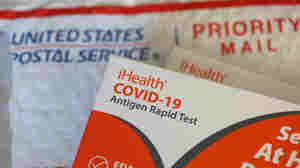A medical worker administers a coronavirus test at a new testing site at the Times Square subway station in New York City on Monday. Scott Heins/Getty Images hide caption

The Coronavirus Crisis
Everything you need to know about the global pandemicMap showing the COVID-19 risk level in each state. Center for Systems Science and Engineering at Johns Hopkins University, Census Bureau 2019 population estimates, 2020 Census (U.S. territories) hide caption
A firefighter tests the seal on his N95 mask at the start of his shift in Glen Burnie, Md. With the spread of omicron, experts say to wear high-filtration respirators in public indoor spaces for the best protection. Alex Edelman/AFP via Getty Images hide caption
White House COVID-19 Response Coordinator Dr. Ashish Jha has urged all Americans to take the new COVID-19 Bivalent vaccine booster. Kevin Dietsch/Getty Images hide caption
Gearing up for fall, health officials are recommending a new round of booster shots. Rogelio V. Solis/AP hide caption
The Biden administration plans to offer updated booster shots in the fall. Mario Tama/Getty Images hide caption
Summer boosters for people under 50 shelved in favor of updated boosters in the fall
President Biden departs Holy Trinity Catholic Church in the Georgetown section of Washington, D.C., after attending a Mass on July 17. Andrew Harnik/AP hide caption
A selfie of Beth Kenny (foreground), their wife Adina (middle), and their child Vyla sitting in their backyard in Alameda, Calif. Since the lifting of COVID safety measures, Kenny and their family have had to pull back from indoor activities, and they struggle to explain why to Vyla. Beth Kenny hide caption
On Wednesday, May 4th, 2022 a mix of masked and unmasked individuals shop at the Portland Farmers Market in Shemanski Park in Portland, OR. Leah Nash/The Washington Post / Getty Images hide caption
A Covid-19 testing site stands on a Brooklyn street corner in April. Spencer Platt/Getty Images hide caption
A new dominant omicron strain in the U.S. is driving up cases — and reinfections
Teachers across the country report high levels of stress and burnout after a school year marked by protests, Covid surges and gun violence. (Photo by Jon Cherry/Getty Images) Jon Cherry/Getty Images hide caption
Teachers Reflect on a Tough School Year: 'It's Been Very Stressful'
A child receives the Pfizer BioNTech vaccine at the Fairfax County Government Center in Annandale, Va., last November. Vaccines will soon be available for children as young as 6 months old. Chip Somodevilla/Getty Images hide caption
A child receives the Pfizer BioNTech COVID-19 vaccine at the Fairfax County Government Center in Annandale, Va., in November 2021. A committee of advisers to the Food and Drug Administration recommended Wednesday that the agency expand authorization of COVID-19 vaccines to children as young as 6-months-old. Chip Somodevilla/Getty Images hide caption
Dr. Anthony Fauci testifies before a Senate Health, Education, Labor, and Pensions Committee hearing on Jan. 11. Greg Nash/AP hide caption
Flags at the base of the Washington Monument fly at half staff to mark one 1 million deaths attributed to COVID-19. Win McNamee/Getty Images hide caption
The federal government is sending out a third round of free rapid antigen COVID-19 tests through the U.S. Postal Service. Justin Sullivan/Getty Images hide caption
A Covid-19 testing van stands in Times Square on May 03, 2022 in New York City. Health officials announced on Monday that New York City will raise its COVID alert level to medium. Spencer Platt/Getty Images hide caption
As COVID-19 Cases Surge Again, Public Health Leaders See A Turning Point
A mask is seen on the ground at John F. Kennedy Airport on April 19, 2022 in New York City. Spencer Platt/Getty Images hide caption
Dr. Anthony Fauci, chief medical adviser to President Biden, cites the U.S. vaccination program and previous widespread transmission of the coronavirus as reasons why the U.S. is not now under pandemic conditions. Here, travelers wait at Miami International Airport last week after mask requirements were lifted. Daniel Slim/AFP via Getty Images hide caption
People arrive at a COVID-19 testing station in Houston, Texas, on Jan. 7. Texans were rushing to get tested as the state experienced an unprecedented spike in infections from the omicron variant. Francois Picard/AFP via Getty Images hide caption
President Joe Biden and Vice President Kamala Harris walk to the Oval Office after an event in the Rose Garden on April 11, 2022. Carolyn Kaster/AP hide caption
Travelers walk through Ronald Reagan Washington National Airport in Arlington, Virginia, on April 19, 2022. Stefani Reynolds/AFP via Getty Images hide caption
What The End Of The Mask Mandate Means For The Pandemic — And High-Risk Travelers
A man wearing a face mask to curb the spread of coronavirus walks past a health campaign poster in the Westminster underground train station, in London. Matt Dunham/AP hide caption



























